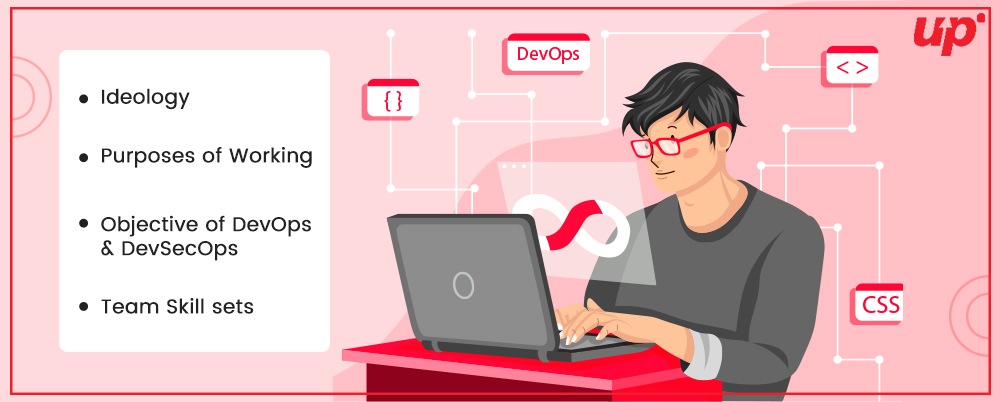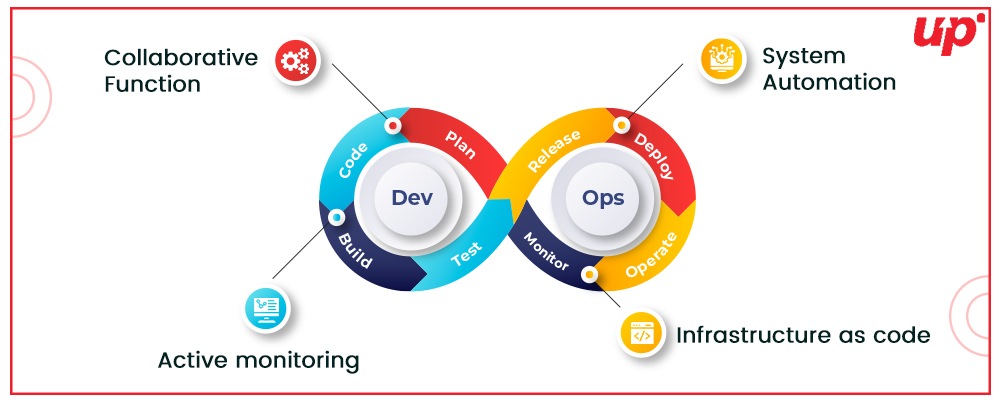DevOps & DevSecOps are the modernized approaches to mobile app development. Operations and development are combined through the DevOps approach, whereas security is the primary emphasis of the DevSecOps subgroup. Despite having differing objectives, the two notions are mutually compatible. Basically, DevOps concentrates on the pace of application delivery and DevSecOps augments the speed of delivering apps rapidly as feasible with security.
Utilising the advantages of DevOps & DevSecOps you can reduce the drawbacks of the mobile app development process as they assist to develop more secure apps in a trusted environment and speedy delivery of apps.
What are the uses of DevOps?

DevOps is a method of app development that has a strong emphasis on interaction, collaboration, and integration between app developers and IT operations. Implementing DevOps enhances this association and Interaction and unlocks high business value. It is mostly used for the following purposes.
- Enhancing the stability of the system
- Cost-effective development through automation
- Providing secure network
- Improving relationships between development and operation departments
- Saving time for projects by Speeding up deployment processes
- Amplifying creativity and innovation in the development process
- Helping in team collaboration from multiple locations or offices that enable quick sharing of ideas among the teams over video chat, email, etc.
What are the uses of DevSecOps?
DevSecOps or security of DevOps provides seamless app security and augments the secure app delivery process.
DevSecOps uses Automation, monitoring, and enforcement process to ensure the security of the apps. Automated testing and enforcement guidelines are parts of this.
It detects vulnerabilities in the code and prompts automatic repair before the code is used in product development.
What are the common facts between DevOps & DevSecOps?
 From the core these two approaches DevOps & DevSecOps have many common facts like focusing on collaboration, using Automation and improving the security of the organization.
From the core these two approaches DevOps & DevSecOps have many common facts like focusing on collaboration, using Automation and improving the security of the organization.
Collaborative Function:
DevOps collaborates with developers and operations whereas DevSecOps joins developers with security. The strategies DevOps & DevSecOps must accomplish rapid iteration and development without compromising the quality and security of the environment.
System Automation:
Automation is the important element of DevOps & DevSecOps. It is the practice of setting up scripts to automate recurring tasks. Automation may cut down on the time and effort needed to complete repetitive chores, enabling the developers to concentrate on more crucial goals. For example,
- To prevent manually rebuilding the server every time code changing, automating it with DevOps & DevSecOps saves time, manual labour and cost.
- You can automate system security audits to keep you free from repetitive assessments of system vulnerabilities.
Active monitoring:
The process of obtaining, evaluating, and responding to system information is known as monitoring. Every DevOps pipeline must have monitoring. It is a crucial component of DevSecOps since it assists in the detection of errors in your apps. Active monitoring is a key component of DevSecOps, allowing you to spot risks and take appropriate action.
Infrastructure as code
You may automate the construction and maintenance of resources including servers, networks, and databases using a technique called infrastructure as code (IAC). Instead of manually constructing them each time you need them, you’ll be able to specify these resources in code.
This feature of DevOps & DevSecOps is used to automate the provisioning, deployment, configuration, and administration of computer infrastructure. Its beneficial effect can be found in cloud settings. Due to the fact that you may scale up or down quickly based on how busy your site is at any particular time.
Visible Difference between DevOps and DevSecOps:
Though the operation type is almost the same for DevOps & DevSecOps, there is a huge Difference between DevOps and DevSecOps. Here, we’ll see the basic differences.

Ideology:
DevOps & DevSecOps have quite distinct ideas. DevSecOps is a way of thinking, whereas DevOps is a culture. The DevOps movement’s guiding ideas include:
- Removing obstacles to communication between the operations and development teams
- Encouraging automation to facilitate faster delivery
- Increasing the transparency of current initiatives
Although these are not the primary emphasis of DevSecOps, DevSecOps, on the other hand, focuses on approaching cybersecurity through continuous software development cycles.
Next, make sure you have all the necessary equipment available so your team can work effectively and securely. For every employee in your firm to stay up with these quick changes, it also requires adopting automation where it is feasible.
Purposes of Working:
Another key Difference between DevOps and DevSecOps is in their working purpose. DevOps is a software development technique that strives to close the gap between development teams (Dev) and IT operations teams (Ops) by bringing people, processes, and products together to provide high-quality applications and services more quickly. The whole software development lifecycle involves cooperation and communication between the IT operations team and developers.
DevSecOps approach maintains the security involved in each stage of the development process. It is integrated into the DevOps process/pipeline. DevSecOps automates security and deploys security and scale up the DevOps approach.
Goal of DevOps & DevSecOps:
Here, you can see the goal wise Difference between DevOps and DevSecOps. The objective of DevOps is to eliminate organizational silos that develop when there is insufficient communication and collaboration among the various teams within an organization. This is done by fostering a culture where teams can cooperate and work together by creating and automating a continuous delivery pipeline.
DevSecOps aims to integrate security practices into the continuous integration pipeline and shift security activities throughout the development lifecycle. Application security is ensured throughout the whole development process by the DevSecOps team.
Team Skill sets:
The required skill set for these two teams creates a big Difference between DevOps and DevSecOps DevOps engineers are Linux system administrators with scripting expertise. They have to be proficient in a variety of DevOps tools and technologies.
In contrast, DevSecOps engineers must strive to integrate security into their cloud. They possess the following abilities:
- Fixing issues and coming up with solutions.
- coordinating across many departments
- Technical standards definition.
- Setting up general security guidelines.
Approach:
The Difference between DevOps and DevSecOps is found in their operational Approach.
DevOps is a system-oriented approach that is founded on a cultural mindset that supports the agile movement. DevOps is viewed as expanding the agile software development concepts in various respects. DevOps focuses on increasing productivity and efficiency to shorten the time between product conception and launch.
Contrarily, DevSecOps emphasises security first and security always strategy by evaluating all underlying components without delaying the development process. The purpose is to include security in the building design from the beginning.
Final thought:
Even though they seem to be mutually exclusive, DevOps & DevSecOps are most effective when combined. Both approaches aim to make things simpler for the development and support teams, and they are both acceptable in different situations.
But, we must constantly incorporate security testing into our CI/CD pipelines since security is more crucial than ever. DevSecOps is a set of cultural norms, mentalities, procedures, and tools, much like DevOps. Test automation should be a key component of DevSecOps techniques. The Difference between DevOps and DevSecOps will help you in choosing the right approach. Hence, finding the approach that works well in each of these circumstances is the key.
FAQs
1. What are the plans for DevSecOps?
One single term may sum up the direction of DevSecOps: Increased testing, automation, integration, shift left, thorough scans, etc. are all ways to include security from the beginning of the development process.
2. What is the principal commercial advantage of DevOps?
The basic principal of DevOps is its reducing time of development, recurrent deployments, and more consistent releases in accordance with corporate goals.
3. Why does the business need DevSecOps?
One of the most effective techniques to aid in attack prevention is DevSecOps, which includes automated software testing and a security champion’s program.











